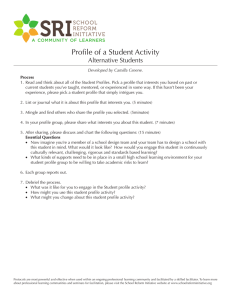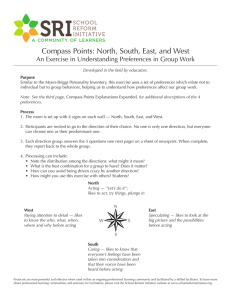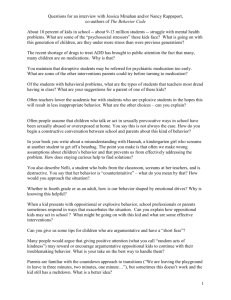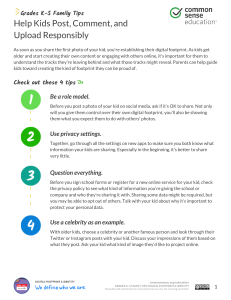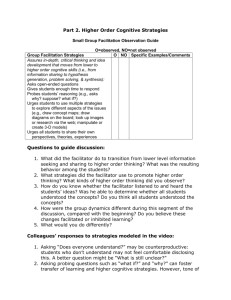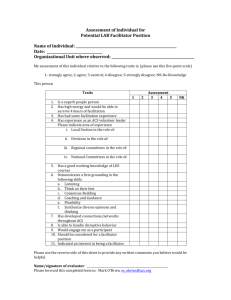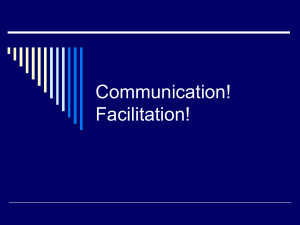Student Profiles for - School Reform Initiative
advertisement
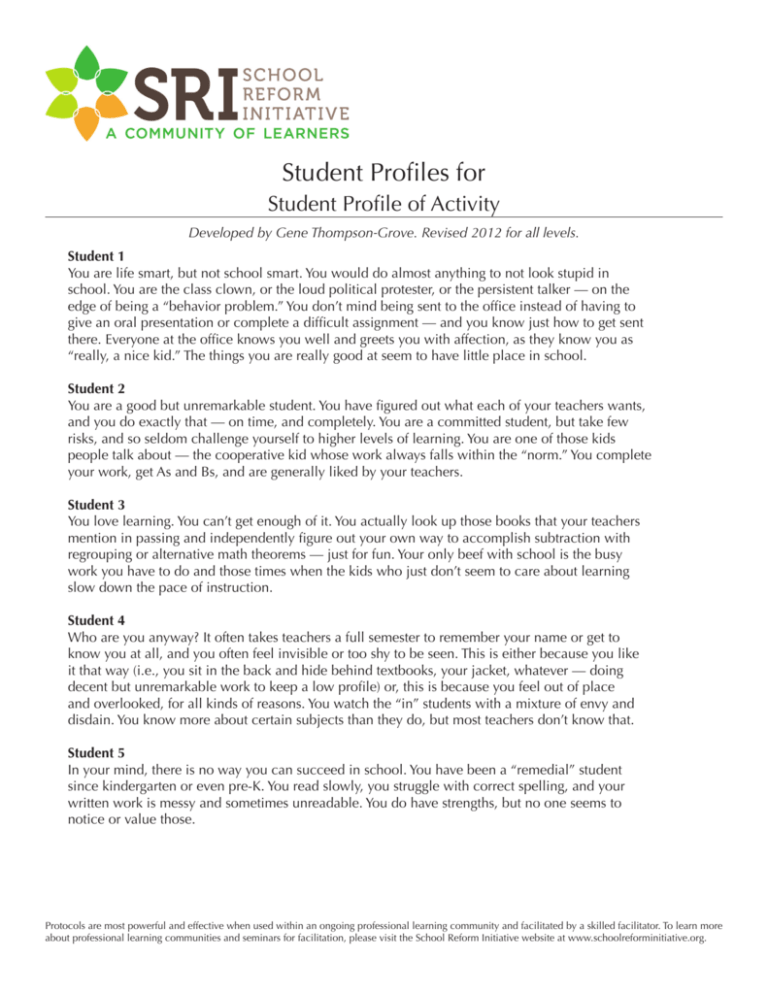
Student Profiles for Student Profile of Activity Developed by Gene Thompson-Grove. Revised 2012 for all levels. Student 1 You are life smart, but not school smart. You would do almost anything to not look stupid in school. You are the class clown, or the loud political protester, or the persistent talker — on the edge of being a “behavior problem.” You don’t mind being sent to the office instead of having to give an oral presentation or complete a difficult assignment — and you know just how to get sent there. Everyone at the office knows you well and greets you with affection, as they know you as “really, a nice kid.” The things you are really good at seem to have little place in school. Student 2 You are a good but unremarkable student. You have figured out what each of your teachers wants, and you do exactly that — on time, and completely. You are a committed student, but take few risks, and so seldom challenge yourself to higher levels of learning. You are one of those kids people talk about — the cooperative kid whose work always falls within the “norm.” You complete your work, get As and Bs, and are generally liked by your teachers. Student 3 You love learning. You can’t get enough of it. You actually look up those books that your teachers mention in passing and independently figure out your own way to accomplish subtraction with regrouping or alternative math theorems — just for fun. Your only beef with school is the busy work you have to do and those times when the kids who just don’t seem to care about learning slow down the pace of instruction. Student 4 Who are you anyway? It often takes teachers a full semester to remember your name or get to know you at all, and you often feel invisible or too shy to be seen. This is either because you like it that way (i.e., you sit in the back and hide behind textbooks, your jacket, whatever — doing decent but unremarkable work to keep a low profile) or, this is because you feel out of place and overlooked, for all kinds of reasons. You watch the “in” students with a mixture of envy and disdain. You know more about certain subjects than they do, but most teachers don’t know that. Student 5 In your mind, there is no way you can succeed in school. You have been a “remedial” student since kindergarten or even pre-K. You read slowly, you struggle with correct spelling, and your written work is messy and sometimes unreadable. You do have strengths, but no one seems to notice or value those. Protocols are most powerful and effective when used within an ongoing professional learning community and facilitated by a skilled facilitator. To learn more about professional learning communities and seminars for facilitation, please visit the School Reform Initiative website at www.schoolreforminitiative.org. Student 6 You are a finely tuned teacher-pleasing machine. You know exactly what you need to do to maximize your grade and you do it (no matter what) and then some. You are organized, disciplined and focused — on your homework, on getting good grades, and on your extra-curricular activities. Your teachers know you will always volunteer for anything they ask — and you often do. Student 7 You complete the basics of major assignments — the lowest passing grade possible for the least amount of work is your mantra. You know all the tricks: make up tests, rewrites, re-dos, extra credit points, parental pressure, group work (with the right partners). You put more effort into beating the game than into learning. Student 8 You have a creative mind, love the arts (drawing, music, dance, drama). You have a hard time staying focused on written work, which is all anyone seems to want to do in school. You are happy with yourself, but often feel like you are “marching to a different drummer.” Student 9 Who said academics and classes and grades are the most important things about school? As far as you are concerned, you go to school to see your friends and to participate in what they call the “extra-curricular” activities—clubs and specials, athletic events, school-sponsored skate-nights, etc. These activities don’t seem “extra” to you at all, but instead are central to what school is really all about. Student 10 Your family has big plans for you. They left their homeland so you could succeed, but they don’t know what it feels like to be a student with an accent whose name the teachers sometimes can’t pronounce. You don’t ask for extra help, even when it’s offered — your family insists that you stay “below the radar” and not do anything that might call attention to their immigration status. Student 11 You aren’t sure who you are or who you are going to become. What you do know is that you don’t fit in. Maybe other kids make fun of you or maybe you bully others. You are a loner or hang out with a few other “misfits.” Your parents are concerned about you, but no one — parents, teachers, or other students — understand how painful it is to be you. Protocols are most powerful and effective when used within an ongoing professional learning community and facilitated by a skilled facilitator. To learn more about professional learning communities and seminars for facilitation, please visit the School Reform Initiative website at www.schoolreforminitiative.org.
